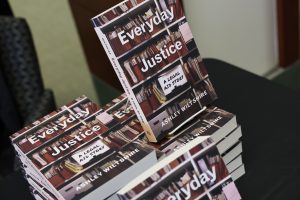Ashley Wiltshire ’72 started working for Legal Services of Nashville, which ultimately became the Legal Aid Society of Middle Tennessee and the Cumberlands, during his second semester in law school. In a candid discussion with Miles Malbrough ’22 and Justin Brooks, Karalyn Berman, Divya Bhat and Victoria Mayhall, all ’23, Wiltshire discussed the challenges of heading a legal aid organization, how the Legal Aid Society of Middle Tennessee and the Cumberlands evolved, and the five-year process of writing a book that’s both a personal history and a chronicle of the legal aid movement.
Takeaways from Ashley Wiltshire’s talk:
- President Lyndon Johnson’s War on Poverty created the Legal Services Program in 1964, providing federal funding for lawyers to serve low-income and indigent clients. Nashville Legal Services, where Wiltshire began his career, was founded in 1968.
- Wiltshire initially pursued a career in ministry. Wiltshire changed his career path from the ministry to law while working on a civil rights project in Albany, Georgia, in 1966, where he “observed that the three law students who were working with a local attorney were getting a lot more work done than we [seminarians] were.” He applied to Vanderbilt because he wanted to work in the South and entered law school intent on work in the public interest.
 He entered the world of legal aid before graduating law school. He was hired to work at Legal Services of Nashville in April 1970 and worked there throughout his second and third years of law school with fellow student Walter Kurtz ‘72, now a retired Tennessee judge. “Walter and I spent as much time in the Stahlman Building [where Nashville Legal Services was located] as in the law school,” Wiltshire recalled.
He entered the world of legal aid before graduating law school. He was hired to work at Legal Services of Nashville in April 1970 and worked there throughout his second and third years of law school with fellow student Walter Kurtz ‘72, now a retired Tennessee judge. “Walter and I spent as much time in the Stahlman Building [where Nashville Legal Services was located] as in the law school,” Wiltshire recalled.- In Nashville, Legal Aid attorneys encountered resistance from some local lawyers, but the Nashville Bar Association supported the organization and its work. Some local Bar members opposed “anything that smacked of civil rights, anything that helped poor people, anything that brought the races together,” Wiltshire said. Some Legal Aid attorneys faced specious disciplinary proceedings, but powerful members of the Nashville Bar defended their civil representation of indigent clients. “They were lawyers, and they knew what lawyers did,” Wiltshire said.
- Nashville Legal Aid attorneys handled cases large and small, from a housing discrimination case that addressed a severe racial disparity in applicants approved for subsidized housing benefits, to small cases such as Social Security appeals and landlord/tenant matters. “Everybody did everything—you did what came in the door. We were flying by the seat of our pants, but we all intuitively knew that we were helping dispossessed people and doing it in concert together,” Wiltshire said.
- Funding and support for Legal Aid was reduced in later years, forcing organizations to adapt. President Richard Nixon, changed the structure of the program, and President Ronald Reagan “tried to abolish Legal Services,” Wiltshire said. Fundraising became essential to Legal Aid’s survival after funding cuts in the 1980s. Congressman Newt Gingrich passed legislation that limited the advocacy work Legal Aid attorneys could do for clients in 1996, forcing some advocacy services out from under the Legal Aid umbrella. Wiltshire described Gingrich’s Contract with America as “a revamping of Richard Nixon’s southern Strategy” that limited Legal Aid attorneys’ ability to engage in legislative advocacy and class action lawsuits and the types of clients public attorneys could serve. “We could no longer represent prisoners, immigrants and others,” he said. Those restrictions spawned spinoff nonprofits, such as the Tennessee Justice Center, that could serve those clients.
- “Clients always came first.” Wiltshire emphasized Legal Aid attorneys’ “clear commitment to caring about their community” as the key to the organization’s success and survival.
- Vanderbilt Law School has “been really supportive of Legal Aid.” Wiltshire’s book mentions 38 Vanderbilt graduates and 10 faculty members, including the late Dean John Wade and Associate Dean for Clinical Affairs Susan Kay ‘78, who is currently serving a second term as board president.